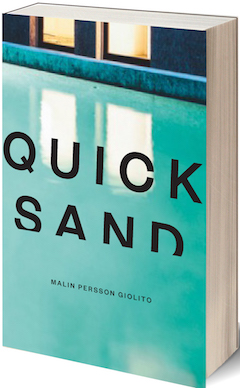Quicksand
by Malin Persson Giolito, trans. by Rachel Willson-Broyles
"It smells like rotten eggs. The air is hazy and gray with gunpowder smoke. Everyone has been shot but me. I haven't got even as much as a bruise."
Malin Persson Giolito's Quicksand opens with a tableau, featuring Dennis, a fat teenager from Uganda; Samir, an academic overachiever; Christer, the homeroom teacher; Amanda, "all cashmere, white gold, and sandals"; and the son of the richest man in Sweden, cradled in the narrator's lap. "People like us don't usually spend time together. Maybe on a Metro platform during a taxi-driver strike, or in the dining car on a train, but not in a classroom."
Maja Norberg is on trial for her role in a school shooting that left her boyfriend and her best friend dead, among others. She has been waiting in isolation in a women's prison for nine months. Media attention has been intense and frenzied: Maja comes from the privileged upper class of Djursholm, a wealthy suburb of Stockholm. She was a good girl, reasonably well-liked and a good student. She has been portrayed in the news as a poor little rich girl, self-centered to the point of disregarding the value of human lives.
In flashback chapters, Maja's story slowly becomes clearer. Bit by bit, her relationships with her alleged victims are revealed. In two sections--one handling the trial and the other leading up to the shooting--Maja's first-person perspective offers a shifting view of the world. "I read somewhere that 'the truth is whatever we choose to believe.' Which sounds even more insane, if that's even possible. Like someone can just decide what's true and what's false?"
Quicksand is Persson Giolito's fourth novel and her first to be translated from Swedish into English. Translator Rachel Willson-Broyles smoothly renders Maja's voice, by turns cynical and yearning, hard-edged and vulnerable. Paired with a knack for deadpan dialogue, this voice presents a realistic impression of an 18-year-old woman, one charged with the most heinous crime in her country's recent memory. The strength and poignancy of Maja's nuanced voice command sympathy, even though she has--perhaps--done terrible things.
The central question of the novel is, of course, Maja's guilt or innocence. Although the trial itself shapes the narrative, she is reluctant to make a claim about her involvement in the shooting, even in thought. Readers must follow along slowly in dual timelines, trying to determine the shifting truth for themselves. Meanwhile, Maja's story imperceptibly expands to take on larger questions and issues: class and immigration, race and racism, criminal justice systems and the media, the consequences of wealth and leisure, love and obsession, what is owed by a parent to a child. The false dichotomy of guilt and innocence plays a central role. It is to Persson Giolito's great credit that such weighty topics move smoothly through a plot that is taut and relentless, even as its protagonist passes monotonous days in a prison cell.
Because Maja's traumatized, often apathetic perspective offers the reader's only view of this story, characterization takes place slowly and leaves holes. Her family and classmates matter only as they matter to her. Dennis, her boyfriend's drug dealer, is of little value. Amanda is both an intimate and an empty-headed cipher--Maja's best friend, like a sister, but alternately familiar and remote. Maja has a real sister, too, who plays a very different role; her parents, unsurprisingly, are due for a certain amount of Maja's scorn. Sebastian's character is at the crux of the plot's mysteries, standing in for all the contradictions implied by wealth, success and dissatisfaction. Maja and Sebastian's romance begins with 15 days in the Mediterranean on a yacht almost 60 meters long, and she comments more than once on "the surreality of it all, that world of postcard-blue and sparkling sunshine and plink-plonk manicures." This surreality drives home that sparkle and money don't buy happiness. Maja will ponder that lesson and others as the trial progresses, as the reader gradually puts together the pieces of her story and as her fate looms.
Quicksand is a novel focused on a school shooting, but in no way feels hackneyed or dependent on its timeliness. In fact, it's not really about a school shooting at all. It's about larger abstractions, like loyalty and codependence, love and guilt, the incredibly complicated business of being a teenager, criminal justice systems (Sweden's in particular, and as a concept), the role of the media and what a parent's job entails. Expert dialogue and irresistible momentum make an all-too-realistic story come breathing off the page. It's a novel that demands compassion, and an appreciation for the fine gradations of situations that tend to be treated as black and white. Part courtroom thriller, part introspection, Quicksand is pulled tight throughout by the suspense, not only of Maja's verdict, but of the elusive "truth" of what really happened in the classroom that day. --Julia Jenkins








